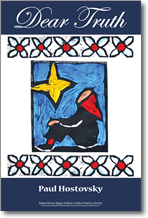
Poems from Dear Truth
Everyone Was Beautiful
The day that everyone was beautiful
was like any other day, the only difference
was that everyone was beautiful and the day itself
was a beautiful summer day or spring day or
one of those late winter days that smells like spring
and if it was fall it was early fall
when it’s all but technically summer and everyone
was simply beautiful, not sexy beautiful
or movie star beautiful or drop dead gorgeous beautiful,
but everyone but everyone had this patina
of slightly bruised longing, this shimmer of
I think I knew you when we were children,
this look of I’ve loved you ever since you were born
and probably longer than that and it all started
with the paperboy careening out of the blue
dawn on his bicycle, pitching to the left and right
with his ballast of fifty today’s papers
in a vast canvas sack slung over his shoulder
balancing himself and the whole world
on the tip of morning, the streets beginning to stir
with shadows and workers and cars
all of which were perfectly beautiful,
and it continued on like that throughout the day
with the gas station attendant and toll collectors
and motorists and pedestrians and clerks—
even the boss, even the boss’s boss who always
seemed an ugly sort of fellow really, especially
on the inside. But on that day even the ugliness
was beautiful—it was a beautiful ugliness
the day that everyone was beautiful and the day itself
was a beautiful summer day.
Eulogy
We were all a little in love with him. He was
a little in love with himself. That sublime
self-centeredness of the true artist. Which didn't
change the fact that he was a selfish prick
and a compulsive masturbator in the figurative
and probably the literal sense. But he was beautiful.
So you couldn't blame him for it. And you couldn't
look at him and you couldn't stop looking at him,
as though beauty were a kind of deformity—
you looked then looked away, then looked some more.
As though your eye were the fly, beauty the open
sore. It was like an affliction. His affliction, and yours.
Yours because it hurt, he was that beautiful. His
because as it faded, I think he finally began to live.
To Leave
Those rocky outcroppings
on the side of the highway
remind me of the planets
the Little Prince visited,
just big enough
for one person and a desk,
a space for thinking to yourself
out in the middle of space,
I think to myself as I drive past,
picturing that little kid
with the long scarf and yellow hair
standing up there. How did he
get around anyway? They never
explained that in the book. Madame
loved that book and wanted us
to love it, too. But I think we
misunderstood it. Something about
a flower and a sheep. A fox and a hat that
was really a snake with an elephant
inside it. That book was harder
than it looked. Maybe that’s why
I’m still thinking about it now,
looking for an exit ramp, light-years
away from the hillocky sphere where I was a kid
myself once. Madame got sick—
and we had a substitute teacher then
who dropped her r’s, even in French.
Every time she dropped an r we dropped
a book, loudly on the floor. Oh how we
tortured her. She got mad, ordered me to
leave: sortez! Minus the r, it sounded
like sauter: to jump. So I jumped
up and down, up and down. I kept
jumping because she kept on yelling:
sauter! sauter! In the end, Madame
never came back. I think she may have
died. It was ambiguous, the way
they left it at the end of that book—you felt
like crying though it wasn’t clear exactly
what happened. Just that it was sad
but also somehow very
beautiful. Sometimes you don’t
quite know why you feel like crying.
You just do. And it feels good, somehow.
Once upon a time I was laughing
when the next thing I knew
a book shut loudly, then a door
was closing behind me
and I was leaving—
walking down an infinitely tessellating
hallway, crying
with a little jump in my step.